| Reviews & Columns |
|
Reviews DVD TV on DVD Blu-ray 4K UHD International DVDs In Theaters Reviews by Studio Video Games Features Collector Series DVDs Easter Egg Database Interviews DVD Talk Radio Feature Articles Columns Anime Talk DVD Savant Horror DVDs The M.O.D. Squad Art House HD Talk Silent DVD
|
DVD Talk Forum |
|
|
| Resources |
|
DVD Price Search Customer Service #'s RCE Info Links |
|
Columns
|
|
|
Game of Thrones: The Complete Seventh Season
HBO // Unrated // December 12, 2017
List Price: $74.99 [Buy now and save at Amazon]
The (Half?) Season:
Maps are featured prominently in this first half of Game of Thrones' final thirteen episodes, appearing as newly-created murals along a floor, buried within ancient texts, or rediscovered in the unkempt halls of a familiar location. Doing so, intentionally or not, reinforces the enormous scope of the lands of Westeros and beyond, in a time when the divided and conflicting forces spread across its surface area may need to band together against a common enemy. Under George R.R. Martin's penmanship, the geography of the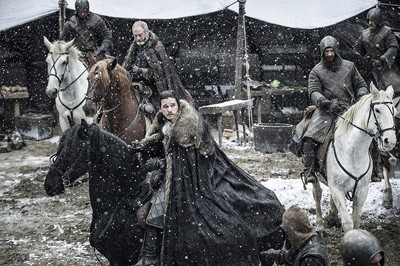 lands he created interwove with the events that transpired in such a way that readers and/or viewers didn't dwindle on any chronological uncertainties; in short, the timeline of events made enough sense. Alas, Winter™ is indeed coming, and the series continues to run out of time for when the beloved -- and not so beloved -- characters must meet it, wrapping up monumental threads in a final run of thirteen episodes. With spectacular craftsmanship and performance value always in tow, Game of Thrones must hurry to make it happen, and that rush can be seen in how this shortened seventh season haphazardly traverses the map.
lands he created interwove with the events that transpired in such a way that readers and/or viewers didn't dwindle on any chronological uncertainties; in short, the timeline of events made enough sense. Alas, Winter™ is indeed coming, and the series continues to run out of time for when the beloved -- and not so beloved -- characters must meet it, wrapping up monumental threads in a final run of thirteen episodes. With spectacular craftsmanship and performance value always in tow, Game of Thrones must hurry to make it happen, and that rush can be seen in how this shortened seventh season haphazardly traverses the map.
Unsurprisingly, the momentum began at the end of the sixth season, which should be viewed before progressing with this review. Daenerys Targaryen (Emilia Clarke) and her army of dragons, ex-slaves, unsullied warriors, tribespeople, and a loyal dwarf of a consult (Peter Dinklage) have begun their naval journey across the sea from Essos to Westeros, marking the beginning of her conquest for the throne. A calculated and cruel holocaust at King's Landing has wiped out the requisite individuals for Cersei Lannister (Lena Headey) to accept the crown and begin her gloomy reign as a queen monarch. Further up on the map, the forces and houses of the north gradually swear their allegiance to Jon Snow (Kit Harington) as King in the North, despite the eerie circumstances of his death and revival. Arya (Maisie Williams) progresses deeper into her transformation from a helpless Stark daughter to one of the land's most ruthless assassins, marking off yet another -- highly satisfying! -- target from her list. All this goes down with endless stretches of White Walkers lumbering along the icy tundra toward The Wall, led by the intimidating visage of the Night King, whose identity remains the subject of many fan theories out there.
Perhaps this goes without saying, but the remaining characters in Game of Thrones have undergone significant transformations over the course of their experiences, dictated by grief, victory, and death. Nearly all have had something taken out of them -- both physically and/or mentally -- leaving little of the idealistic spirits once seen at the show's beginning. The performances of the entire cast showcase that burdened, weathered property in the best of ways, manifesting differently between each one, from Kit Harington's low-rumbling determination as Jon Snow and Emilia Clarke's fiery bloodlust as the Mother of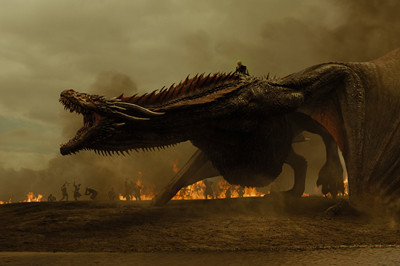 Dragons to Lena Headey's steely, scorned abandon as Cersei Lannister. The enormity of their roles in this battle for Westeros has created a vacuum of attention around them, to which the other significant entities that might now be considered "secondary characters" are bound to their presence, also largely due to this season's resolve to bring them all together. The actions of the Starks, both Arya's murderous chilliness through Maisie Williams and Sansa's post-abuse strength through the poise of Sophie Turner, are now controlled by the context of Jon's rule; Jaime Lannister's humanizing transformation, amply commanded by Nicolaj Coster-Waldau, writhes underneath Cersei's domination; and Peter Dinklage's masterful turn as Tyrion copes with new strategies and sensations with Daenerys' threat breathing down his neck.
Dragons to Lena Headey's steely, scorned abandon as Cersei Lannister. The enormity of their roles in this battle for Westeros has created a vacuum of attention around them, to which the other significant entities that might now be considered "secondary characters" are bound to their presence, also largely due to this season's resolve to bring them all together. The actions of the Starks, both Arya's murderous chilliness through Maisie Williams and Sansa's post-abuse strength through the poise of Sophie Turner, are now controlled by the context of Jon's rule; Jaime Lannister's humanizing transformation, amply commanded by Nicolaj Coster-Waldau, writhes underneath Cersei's domination; and Peter Dinklage's masterful turn as Tyrion copes with new strategies and sensations with Daenerys' threat breathing down his neck.
Initially, those watching the series had a wealth of options to choose from and root for as the one who'd ultimately sit at the Iron Throne and rule Westeros, which was impacted by their individual ruling styles, ambitions, and overall temperaments. Of course, Game of Thrones' reputation for whittling down those options extends beyond the fandom and into the common knowledge of popular culture, driving away some fed-up viewers and keeping others at arm's length from the series due to its cutthroat tendencies with the characters. Picking someone as the optimal ruler based on their ideology still exists as an interesting element hinged on the show's political maneuverings, though the decline in options make the choice even tougher and grayer than it once was, with each ruler sporting noteworthy flaws -- naivete and impulsiveness -- amid their noble intentions or effective pragmatic stratagems within their evil tendencies. Events have transformed this experience, though, into something closer to observing how things will play out instead of inviting one to speculate what's right or wrong for Westeros in the years ahead.
Part of that boils down to the relentless action-driven momentum of this season, where ships sailing to different locations and armed forces marching forward promise new interactions and clashes that have been long anticipated by fans of the series. Naturally, the show's workmanship can be seen in every frame throughout Game of Thrones' seventh season, marrying stunning locations and impeccable production design with careful implementation of computer-generated imagery. Ground battles between massive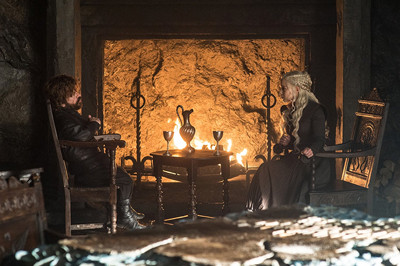 forces, naval skirmishes, and the chaos of fending off hordes of zombies produce thoroughly exhilarating set pieces throughout most of this cluster of seven episodes, but they also each possess urgency and emotion because of the people entangled and pitted against one another in each one. Nobody feels safe anymore, and the show's ruthless plotting has ensured that it's a valid concern. This season, Game of Thrones gets about as close to the threshold of danger as it can without doing anything -- read: killing anyone off -- that'll outright anger the audience, and yes, that results in what appears to be a few pulled punches in terms of who gets out of situations and who doesn't.
forces, naval skirmishes, and the chaos of fending off hordes of zombies produce thoroughly exhilarating set pieces throughout most of this cluster of seven episodes, but they also each possess urgency and emotion because of the people entangled and pitted against one another in each one. Nobody feels safe anymore, and the show's ruthless plotting has ensured that it's a valid concern. This season, Game of Thrones gets about as close to the threshold of danger as it can without doing anything -- read: killing anyone off -- that'll outright anger the audience, and yes, that results in what appears to be a few pulled punches in terms of who gets out of situations and who doesn't.
To make this season's big events happen, however, the writers have employed what's easily the biggest and most frustrating issue with Game of Thrones to date, arguably the show's biggest narrative hurdle: how quickly travel happens, worsening with each episode. Granted, a few head-scratching moments in the timeline occurred in prior seasons, but the immediacy of the plot has forced the writing's hand this time around, and it's noticeable. At first, the concerns are limited to the relative rapidity of boat travel, in which both the scripting and the editing make a full journey seem like travelers hopped through a teleportation portal; the next-to-last scene of one episode has people embarking on a voyage, and the next begins with their arrival, showing little indication of and little interest the passage of time. The "fudging" of the timeline -- their words, not mine -- reaches significant levels in the second-to-last episode of the season, "Beyond the Wall", in which the quickness of human sprinting, ravens flying, and rescue missions coming to fruition throw major kinks in the practicality of how the story plays out. Timetables and theorizing have been generated by the gaps in chronological logic here, and once that begins, the suspension of disbelief begins to melt away.
Game of Thrones banks on the idea that if the timeline comes into question like this, then the end will justify the means … and for the most part, that happens. The dramatic action that spawns from the extensive travels consistently elevates the stakes, revealing brutality, camaraderie, and usage of elements unseen in prior episodes, especially when it comes to Daenerys and her dragons' firepower. These could've been achieved in other ways, though, whereas the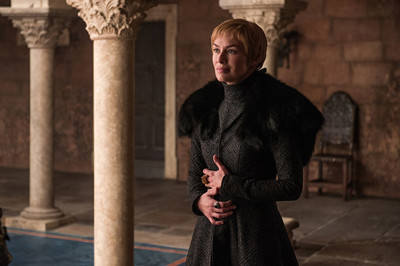 interactions that happen between familiar characters aren't so easily achieved. Certain characters reunite and speak with one another after prolonged periods apart, and it makes for satisfying, yet almost consistently melancholy theatrics, even downright hostile and heartrending in one instance. Others finally meet for the first time in long-anticipated exchanges, and the dynamics created between them can be surprising in their impact on the major players, especially, again, when Daenerys begins asserting herself amongst the denizens of Westeros. And others still are thrown together unexpectedly -- see: the White Walker hunting party in "Beyond the Wall" -- which generates engaging and amusing interactions informed by their backstories.
interactions that happen between familiar characters aren't so easily achieved. Certain characters reunite and speak with one another after prolonged periods apart, and it makes for satisfying, yet almost consistently melancholy theatrics, even downright hostile and heartrending in one instance. Others finally meet for the first time in long-anticipated exchanges, and the dynamics created between them can be surprising in their impact on the major players, especially, again, when Daenerys begins asserting herself amongst the denizens of Westeros. And others still are thrown together unexpectedly -- see: the White Walker hunting party in "Beyond the Wall" -- which generates engaging and amusing interactions informed by their backstories.
This is a particularly unique season of Game of Thrones for a variety of reasons: the reduced number of episodes, which, regardless of the overall runtime, does impact the flow of the narrative; the immense amount of storytelling left to tackle for the series to reach even a baseline conclusion; and the continued absence of George R.R. Martin's novel iteration of the plotting. That also makes it growingly difficult to evaluate the overarching quality of the season, because showrunners David Benioff and D.B. Weiss had -- have -- a substantial challenge ahead of them in wrapping up a beloved series with so many narrative threads strung across the enormous surface area of Westeros (and Essos), with only thirteen episodes to do it in grand fashion. These seven episodes pave the way for the conclusion, delivering anticipated character moments, audacious and exhilarating action, and a requisite amount of bleakness along the way. Yet, like other two-part final installments, the hasty progression across time and space and the momentous implications of the cliffhanger leave this batch of episodes feeling like little more than preparation for what's to come, ending with what plays like a mid-season finale instead of a partial destination along a mapped-out narrative.
Check Out DVDTalk's Previous Coverage of Game of Thrones on Blu-ray:
Season One | Season Two | Season Three | Season Four | Season Five | Season Six
The Blu-ray:
Game of Thrones: The Complete Seventh Season swoops down onto Blu-ray from HBO and Warner Bros. in a recognizable, relatively standard, yet smaller-scale presentation this time around. A clear slipcase adorns the outer package with text, which disappears after slipping it off and revealing the harder-shell cardboard case underneath, emblazoned with the face of the Night King on the front. The foldout digipack, somewhat similarly to previous seasons, features several images of the primary actors' faces, while a still shot of a noteworthy scene from the season sits behind the disc hubs. A one-page foldout Booklet made of sturdy-ish card stock goes over the distribution of the extras and offers descriptions of each episode.
Video and Audio:
Every year, the cinematography of Game of Thrones seems to improve in such a way that it's hard to imagine there being anything more striking for the series to display, and every year, there's something new to the imagery that defies those expectations. Season 7 is no different, reaching a particularly stunning point once the story arrives at Dragonstone, where the angular, windswept stone and uniquely dark beaches render breathtaking scenery filled with exquisite textures and captivating gradations of subtle color and grayscale. The Red Dragon digital photography, presented from HBO in 1080p AVC transfers at the broadcast aspect ratio of 1:78, are predictably stellar in every way: rich skin tones and supple environment shades that adjust to the many locations' temperatures; rich and moody black levels that relish the gloomy halls and basements of keeps; and the details of fur and hair, snowfall and dirt, dragonscale and decaying flesh are exceptionally sharp. It's hard to find anything to complain about with the image, beyond a few slightly elevated black levels in really dark sequences, and even those ensure that hidden details are made visible. Delightful.
Prior seasons of Game of Thrones have had their fair share of intense, bombastic sequences that take their sound designs up to the caliber of big-budget Hollywood movies, but this one in particular has an enormous amount of action -- sea warfare, dragon assaults, and skirmishes with screeching undead -- that elevates the series to another level. The 7.1 Atmos object-based surround tracks are up to the challenge, tackling both the intensity and subtlety of the sound design with impeccable stability and scope across the channels. The explosiveness of fire attacks and the clanking of ground warfare project a tremendous amount of both lower-end responsiveness and higher end clarity; the searing of fire and the clanking of blades are sharp and pronounced, while the impact of raging fire and combat thumps hit hard at the bass channel. Dialogue is crystal clear and delicately reactive to the front channels, with a nice caliber of midrange and lower-frequency bass response for male voices. Ambient effects sprawl out to the back channels, from the haunting wisps of wind to the rush of dragon wings and screams of the undead, while the fierce orchestral music propels the energy forward with careful consideration of the accompanying sound effects. A lengthy host of subtitles and sound options, including a standard surround (non-ATMOS) English track, are available.
Special Features:
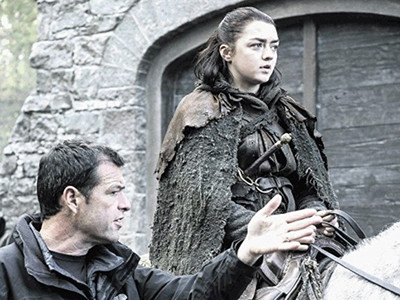 It should makes sense: there are fewer episodes this season, so naturally there's going to be fewer Audio Commentaries this time around … right? Not so fast. While, of course, all episodes contain their own commentary with various members of the cast and crew, four of ‘em contain two commentaries, bringing the grand total to eleven (!) tracks. For most of the double-commentary episodes, they break down into an actor-driven track and a technical production-based track, though understandable both the commentaries available for "The Spoils of War", a particularly popular and involved action-driven episode, features a duo of tracks devoted to analyzing the construction of said episodes. Each episode also comes equipped with an In-Episode Guide, which activates handy icons that'll tell the viewer pertinent information and get them caught up if needed at any given point.
It should makes sense: there are fewer episodes this season, so naturally there's going to be fewer Audio Commentaries this time around … right? Not so fast. While, of course, all episodes contain their own commentary with various members of the cast and crew, four of ‘em contain two commentaries, bringing the grand total to eleven (!) tracks. For most of the double-commentary episodes, they break down into an actor-driven track and a technical production-based track, though understandable both the commentaries available for "The Spoils of War", a particularly popular and involved action-driven episode, features a duo of tracks devoted to analyzing the construction of said episodes. Each episode also comes equipped with an In-Episode Guide, which activates handy icons that'll tell the viewer pertinent information and get them caught up if needed at any given point.
Few people are going to say "no" when you ask them whether they'd be interested in learning more about how the art departments create the world of Westeros, and this From Imagination to Reality: Inside the Art Department (24:26, 21:59; 16x9 HD) two-part featurette does so by offering an in-depth, open-book glimpse at creating the seventh season's locations, both the exteriors and interiors. Through interviews with the show's creators and artists, each piece tracks through the real-world references used, how digital modeling factored into the production, and some actual footage capturing how they're all created, keeping descriptions straightforward yet illuminating. From dragon skulls and stone thrones to adding onto and maintaining existing sets and the fusion of Chinese and Viking themes in creating a ship, there's a lot of interesting nuggets for fans to digest, accompanied by beautifully photographed behind-the-scenes footage.
While the art featurette comes at the audience on a technical angle, Fire & Steel: Creating the Invasion of Westeros (30:04, 16x9 HD) operates more around dissecting and revealing perspectives on the narrative, behind character motives and internalizations. Interviews with the showrunners and cast put a fun spin on those stock interviews of people talking about what their characters are doing over the course of a season, complimented with additional appreciation for the production department while discussing their immersion in the world within which they inhabit. They follow along with the plot, but it's handled in a fairly interesting way, with thrusts and jabs of thematic and dramatic poignancy amid the discussion.
HBO have once again also offered a Histories and Lore (HD) section, which offers half-animated stills revealing pieces of historical information that perhaps might've not been explained as well during the season. In-character performances from several of the characters tell the tales, which makes for entertaining and partly insightful snippets. Disc Three is where the bulk of the supplemental action takes place, since the first two discs only contain the episodes and their commentaries.
Final Thoughts:
The sixth season of Game of Thrones may have seen the series' individual parts starting to funnel into a coherent and engaging endpoint, but there was still a long way to go for the story, and its many spread-out characters, to band together and arrive at that point ... long enough for two, even three full seasons. The show doesn't have that kind of time, though, as it needs to wrap everything up in the span of thirteen episodes, split up into two shortened seasons. The first of these seven episodes make up Season 7, and it copes with a few of the same issues as other final installments split into two: regardless of the exquisite craftsmanship, it comes across as the groundwork for a more impactful second half, and there's a lot of ground needed to be covered. Even with this split-up presence and some iffy chronology to the events, Game of Thrones's seventh season delivers exquisite fantasy action, intriguing political maneuvers, and engaging dramatic interplay between characters both fond of each other and who spite one another. It just does so in a hurry, and with foresight in mind. HBO/WB's Blu-ray looks and sounds tremendous, and of course comes equipped with a fine array of extras, which takes a heartily yet cautiously recommended season into the spectrum of a High Recommendation.
Thomas Spurlin, Staff Reviewer -- DVDTalk Reviews | Personal Blog/Site
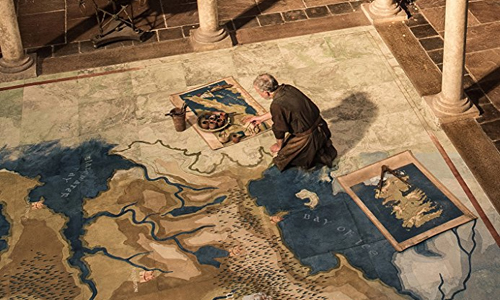 |
Maps are featured prominently in this first half of Game of Thrones' final thirteen episodes, appearing as newly-created murals along a floor, buried within ancient texts, or rediscovered in the unkempt halls of a familiar location. Doing so, intentionally or not, reinforces the enormous scope of the lands of Westeros and beyond, in a time when the divided and conflicting forces spread across its surface area may need to band together against a common enemy. Under George R.R. Martin's penmanship, the geography of the
 lands he created interwove with the events that transpired in such a way that readers and/or viewers didn't dwindle on any chronological uncertainties; in short, the timeline of events made enough sense. Alas, Winter™ is indeed coming, and the series continues to run out of time for when the beloved -- and not so beloved -- characters must meet it, wrapping up monumental threads in a final run of thirteen episodes. With spectacular craftsmanship and performance value always in tow, Game of Thrones must hurry to make it happen, and that rush can be seen in how this shortened seventh season haphazardly traverses the map.
lands he created interwove with the events that transpired in such a way that readers and/or viewers didn't dwindle on any chronological uncertainties; in short, the timeline of events made enough sense. Alas, Winter™ is indeed coming, and the series continues to run out of time for when the beloved -- and not so beloved -- characters must meet it, wrapping up monumental threads in a final run of thirteen episodes. With spectacular craftsmanship and performance value always in tow, Game of Thrones must hurry to make it happen, and that rush can be seen in how this shortened seventh season haphazardly traverses the map. Unsurprisingly, the momentum began at the end of the sixth season, which should be viewed before progressing with this review. Daenerys Targaryen (Emilia Clarke) and her army of dragons, ex-slaves, unsullied warriors, tribespeople, and a loyal dwarf of a consult (Peter Dinklage) have begun their naval journey across the sea from Essos to Westeros, marking the beginning of her conquest for the throne. A calculated and cruel holocaust at King's Landing has wiped out the requisite individuals for Cersei Lannister (Lena Headey) to accept the crown and begin her gloomy reign as a queen monarch. Further up on the map, the forces and houses of the north gradually swear their allegiance to Jon Snow (Kit Harington) as King in the North, despite the eerie circumstances of his death and revival. Arya (Maisie Williams) progresses deeper into her transformation from a helpless Stark daughter to one of the land's most ruthless assassins, marking off yet another -- highly satisfying! -- target from her list. All this goes down with endless stretches of White Walkers lumbering along the icy tundra toward The Wall, led by the intimidating visage of the Night King, whose identity remains the subject of many fan theories out there.
Perhaps this goes without saying, but the remaining characters in Game of Thrones have undergone significant transformations over the course of their experiences, dictated by grief, victory, and death. Nearly all have had something taken out of them -- both physically and/or mentally -- leaving little of the idealistic spirits once seen at the show's beginning. The performances of the entire cast showcase that burdened, weathered property in the best of ways, manifesting differently between each one, from Kit Harington's low-rumbling determination as Jon Snow and Emilia Clarke's fiery bloodlust as the Mother of
 Dragons to Lena Headey's steely, scorned abandon as Cersei Lannister. The enormity of their roles in this battle for Westeros has created a vacuum of attention around them, to which the other significant entities that might now be considered "secondary characters" are bound to their presence, also largely due to this season's resolve to bring them all together. The actions of the Starks, both Arya's murderous chilliness through Maisie Williams and Sansa's post-abuse strength through the poise of Sophie Turner, are now controlled by the context of Jon's rule; Jaime Lannister's humanizing transformation, amply commanded by Nicolaj Coster-Waldau, writhes underneath Cersei's domination; and Peter Dinklage's masterful turn as Tyrion copes with new strategies and sensations with Daenerys' threat breathing down his neck.
Dragons to Lena Headey's steely, scorned abandon as Cersei Lannister. The enormity of their roles in this battle for Westeros has created a vacuum of attention around them, to which the other significant entities that might now be considered "secondary characters" are bound to their presence, also largely due to this season's resolve to bring them all together. The actions of the Starks, both Arya's murderous chilliness through Maisie Williams and Sansa's post-abuse strength through the poise of Sophie Turner, are now controlled by the context of Jon's rule; Jaime Lannister's humanizing transformation, amply commanded by Nicolaj Coster-Waldau, writhes underneath Cersei's domination; and Peter Dinklage's masterful turn as Tyrion copes with new strategies and sensations with Daenerys' threat breathing down his neck. Initially, those watching the series had a wealth of options to choose from and root for as the one who'd ultimately sit at the Iron Throne and rule Westeros, which was impacted by their individual ruling styles, ambitions, and overall temperaments. Of course, Game of Thrones' reputation for whittling down those options extends beyond the fandom and into the common knowledge of popular culture, driving away some fed-up viewers and keeping others at arm's length from the series due to its cutthroat tendencies with the characters. Picking someone as the optimal ruler based on their ideology still exists as an interesting element hinged on the show's political maneuverings, though the decline in options make the choice even tougher and grayer than it once was, with each ruler sporting noteworthy flaws -- naivete and impulsiveness -- amid their noble intentions or effective pragmatic stratagems within their evil tendencies. Events have transformed this experience, though, into something closer to observing how things will play out instead of inviting one to speculate what's right or wrong for Westeros in the years ahead.
Part of that boils down to the relentless action-driven momentum of this season, where ships sailing to different locations and armed forces marching forward promise new interactions and clashes that have been long anticipated by fans of the series. Naturally, the show's workmanship can be seen in every frame throughout Game of Thrones' seventh season, marrying stunning locations and impeccable production design with careful implementation of computer-generated imagery. Ground battles between massive
 forces, naval skirmishes, and the chaos of fending off hordes of zombies produce thoroughly exhilarating set pieces throughout most of this cluster of seven episodes, but they also each possess urgency and emotion because of the people entangled and pitted against one another in each one. Nobody feels safe anymore, and the show's ruthless plotting has ensured that it's a valid concern. This season, Game of Thrones gets about as close to the threshold of danger as it can without doing anything -- read: killing anyone off -- that'll outright anger the audience, and yes, that results in what appears to be a few pulled punches in terms of who gets out of situations and who doesn't.
forces, naval skirmishes, and the chaos of fending off hordes of zombies produce thoroughly exhilarating set pieces throughout most of this cluster of seven episodes, but they also each possess urgency and emotion because of the people entangled and pitted against one another in each one. Nobody feels safe anymore, and the show's ruthless plotting has ensured that it's a valid concern. This season, Game of Thrones gets about as close to the threshold of danger as it can without doing anything -- read: killing anyone off -- that'll outright anger the audience, and yes, that results in what appears to be a few pulled punches in terms of who gets out of situations and who doesn't. To make this season's big events happen, however, the writers have employed what's easily the biggest and most frustrating issue with Game of Thrones to date, arguably the show's biggest narrative hurdle: how quickly travel happens, worsening with each episode. Granted, a few head-scratching moments in the timeline occurred in prior seasons, but the immediacy of the plot has forced the writing's hand this time around, and it's noticeable. At first, the concerns are limited to the relative rapidity of boat travel, in which both the scripting and the editing make a full journey seem like travelers hopped through a teleportation portal; the next-to-last scene of one episode has people embarking on a voyage, and the next begins with their arrival, showing little indication of and little interest the passage of time. The "fudging" of the timeline -- their words, not mine -- reaches significant levels in the second-to-last episode of the season, "Beyond the Wall", in which the quickness of human sprinting, ravens flying, and rescue missions coming to fruition throw major kinks in the practicality of how the story plays out. Timetables and theorizing have been generated by the gaps in chronological logic here, and once that begins, the suspension of disbelief begins to melt away.
Game of Thrones banks on the idea that if the timeline comes into question like this, then the end will justify the means … and for the most part, that happens. The dramatic action that spawns from the extensive travels consistently elevates the stakes, revealing brutality, camaraderie, and usage of elements unseen in prior episodes, especially when it comes to Daenerys and her dragons' firepower. These could've been achieved in other ways, though, whereas the
 interactions that happen between familiar characters aren't so easily achieved. Certain characters reunite and speak with one another after prolonged periods apart, and it makes for satisfying, yet almost consistently melancholy theatrics, even downright hostile and heartrending in one instance. Others finally meet for the first time in long-anticipated exchanges, and the dynamics created between them can be surprising in their impact on the major players, especially, again, when Daenerys begins asserting herself amongst the denizens of Westeros. And others still are thrown together unexpectedly -- see: the White Walker hunting party in "Beyond the Wall" -- which generates engaging and amusing interactions informed by their backstories.
interactions that happen between familiar characters aren't so easily achieved. Certain characters reunite and speak with one another after prolonged periods apart, and it makes for satisfying, yet almost consistently melancholy theatrics, even downright hostile and heartrending in one instance. Others finally meet for the first time in long-anticipated exchanges, and the dynamics created between them can be surprising in their impact on the major players, especially, again, when Daenerys begins asserting herself amongst the denizens of Westeros. And others still are thrown together unexpectedly -- see: the White Walker hunting party in "Beyond the Wall" -- which generates engaging and amusing interactions informed by their backstories. This is a particularly unique season of Game of Thrones for a variety of reasons: the reduced number of episodes, which, regardless of the overall runtime, does impact the flow of the narrative; the immense amount of storytelling left to tackle for the series to reach even a baseline conclusion; and the continued absence of George R.R. Martin's novel iteration of the plotting. That also makes it growingly difficult to evaluate the overarching quality of the season, because showrunners David Benioff and D.B. Weiss had -- have -- a substantial challenge ahead of them in wrapping up a beloved series with so many narrative threads strung across the enormous surface area of Westeros (and Essos), with only thirteen episodes to do it in grand fashion. These seven episodes pave the way for the conclusion, delivering anticipated character moments, audacious and exhilarating action, and a requisite amount of bleakness along the way. Yet, like other two-part final installments, the hasty progression across time and space and the momentous implications of the cliffhanger leave this batch of episodes feeling like little more than preparation for what's to come, ending with what plays like a mid-season finale instead of a partial destination along a mapped-out narrative.
Season One | Season Two | Season Three | Season Four | Season Five | Season Six
The Blu-ray:
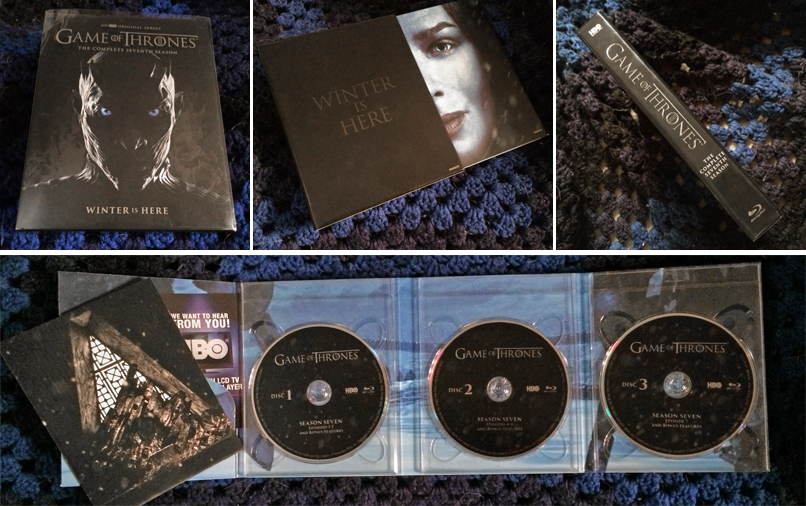 |
Game of Thrones: The Complete Seventh Season swoops down onto Blu-ray from HBO and Warner Bros. in a recognizable, relatively standard, yet smaller-scale presentation this time around. A clear slipcase adorns the outer package with text, which disappears after slipping it off and revealing the harder-shell cardboard case underneath, emblazoned with the face of the Night King on the front. The foldout digipack, somewhat similarly to previous seasons, features several images of the primary actors' faces, while a still shot of a noteworthy scene from the season sits behind the disc hubs. A one-page foldout Booklet made of sturdy-ish card stock goes over the distribution of the extras and offers descriptions of each episode.
Video and Audio:
Every year, the cinematography of Game of Thrones seems to improve in such a way that it's hard to imagine there being anything more striking for the series to display, and every year, there's something new to the imagery that defies those expectations. Season 7 is no different, reaching a particularly stunning point once the story arrives at Dragonstone, where the angular, windswept stone and uniquely dark beaches render breathtaking scenery filled with exquisite textures and captivating gradations of subtle color and grayscale. The Red Dragon digital photography, presented from HBO in 1080p AVC transfers at the broadcast aspect ratio of 1:78, are predictably stellar in every way: rich skin tones and supple environment shades that adjust to the many locations' temperatures; rich and moody black levels that relish the gloomy halls and basements of keeps; and the details of fur and hair, snowfall and dirt, dragonscale and decaying flesh are exceptionally sharp. It's hard to find anything to complain about with the image, beyond a few slightly elevated black levels in really dark sequences, and even those ensure that hidden details are made visible. Delightful.
Prior seasons of Game of Thrones have had their fair share of intense, bombastic sequences that take their sound designs up to the caliber of big-budget Hollywood movies, but this one in particular has an enormous amount of action -- sea warfare, dragon assaults, and skirmishes with screeching undead -- that elevates the series to another level. The 7.1 Atmos object-based surround tracks are up to the challenge, tackling both the intensity and subtlety of the sound design with impeccable stability and scope across the channels. The explosiveness of fire attacks and the clanking of ground warfare project a tremendous amount of both lower-end responsiveness and higher end clarity; the searing of fire and the clanking of blades are sharp and pronounced, while the impact of raging fire and combat thumps hit hard at the bass channel. Dialogue is crystal clear and delicately reactive to the front channels, with a nice caliber of midrange and lower-frequency bass response for male voices. Ambient effects sprawl out to the back channels, from the haunting wisps of wind to the rush of dragon wings and screams of the undead, while the fierce orchestral music propels the energy forward with careful consideration of the accompanying sound effects. A lengthy host of subtitles and sound options, including a standard surround (non-ATMOS) English track, are available.
Special Features:
 It should makes sense: there are fewer episodes this season, so naturally there's going to be fewer Audio Commentaries this time around … right? Not so fast. While, of course, all episodes contain their own commentary with various members of the cast and crew, four of ‘em contain two commentaries, bringing the grand total to eleven (!) tracks. For most of the double-commentary episodes, they break down into an actor-driven track and a technical production-based track, though understandable both the commentaries available for "The Spoils of War", a particularly popular and involved action-driven episode, features a duo of tracks devoted to analyzing the construction of said episodes. Each episode also comes equipped with an In-Episode Guide, which activates handy icons that'll tell the viewer pertinent information and get them caught up if needed at any given point.
It should makes sense: there are fewer episodes this season, so naturally there's going to be fewer Audio Commentaries this time around … right? Not so fast. While, of course, all episodes contain their own commentary with various members of the cast and crew, four of ‘em contain two commentaries, bringing the grand total to eleven (!) tracks. For most of the double-commentary episodes, they break down into an actor-driven track and a technical production-based track, though understandable both the commentaries available for "The Spoils of War", a particularly popular and involved action-driven episode, features a duo of tracks devoted to analyzing the construction of said episodes. Each episode also comes equipped with an In-Episode Guide, which activates handy icons that'll tell the viewer pertinent information and get them caught up if needed at any given point. Few people are going to say "no" when you ask them whether they'd be interested in learning more about how the art departments create the world of Westeros, and this From Imagination to Reality: Inside the Art Department (24:26, 21:59; 16x9 HD) two-part featurette does so by offering an in-depth, open-book glimpse at creating the seventh season's locations, both the exteriors and interiors. Through interviews with the show's creators and artists, each piece tracks through the real-world references used, how digital modeling factored into the production, and some actual footage capturing how they're all created, keeping descriptions straightforward yet illuminating. From dragon skulls and stone thrones to adding onto and maintaining existing sets and the fusion of Chinese and Viking themes in creating a ship, there's a lot of interesting nuggets for fans to digest, accompanied by beautifully photographed behind-the-scenes footage.
While the art featurette comes at the audience on a technical angle, Fire & Steel: Creating the Invasion of Westeros (30:04, 16x9 HD) operates more around dissecting and revealing perspectives on the narrative, behind character motives and internalizations. Interviews with the showrunners and cast put a fun spin on those stock interviews of people talking about what their characters are doing over the course of a season, complimented with additional appreciation for the production department while discussing their immersion in the world within which they inhabit. They follow along with the plot, but it's handled in a fairly interesting way, with thrusts and jabs of thematic and dramatic poignancy amid the discussion.
HBO have once again also offered a Histories and Lore (HD) section, which offers half-animated stills revealing pieces of historical information that perhaps might've not been explained as well during the season. In-character performances from several of the characters tell the tales, which makes for entertaining and partly insightful snippets. Disc Three is where the bulk of the supplemental action takes place, since the first two discs only contain the episodes and their commentaries.
Final Thoughts:
The sixth season of Game of Thrones may have seen the series' individual parts starting to funnel into a coherent and engaging endpoint, but there was still a long way to go for the story, and its many spread-out characters, to band together and arrive at that point ... long enough for two, even three full seasons. The show doesn't have that kind of time, though, as it needs to wrap everything up in the span of thirteen episodes, split up into two shortened seasons. The first of these seven episodes make up Season 7, and it copes with a few of the same issues as other final installments split into two: regardless of the exquisite craftsmanship, it comes across as the groundwork for a more impactful second half, and there's a lot of ground needed to be covered. Even with this split-up presence and some iffy chronology to the events, Game of Thrones's seventh season delivers exquisite fantasy action, intriguing political maneuvers, and engaging dramatic interplay between characters both fond of each other and who spite one another. It just does so in a hurry, and with foresight in mind. HBO/WB's Blu-ray looks and sounds tremendous, and of course comes equipped with a fine array of extras, which takes a heartily yet cautiously recommended season into the spectrum of a High Recommendation.
|
| Popular Reviews |
| Sponsored Links |
|
|
| Sponsored Links |
|
|
| Release List | Reviews | Shop | Newsletter | Forum | DVD Giveaways | Blu-Ray | Advertise |
|
Copyright 2024 DVDTalk.com All Rights Reserved. Legal Info, Privacy Policy, Terms of Use,
Manage Preferences,
Your Privacy Choices | |||||||













